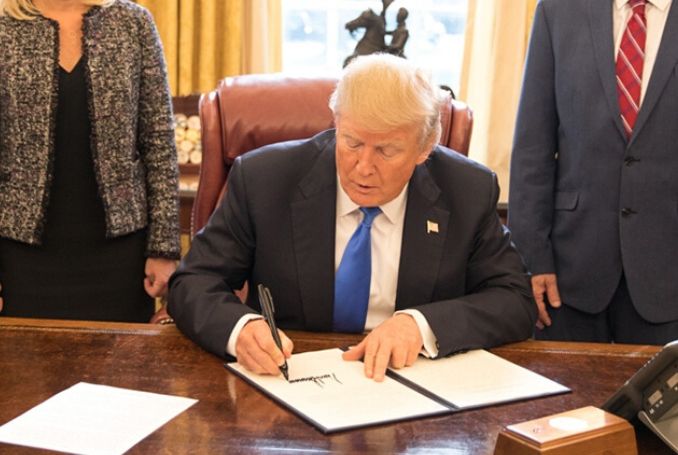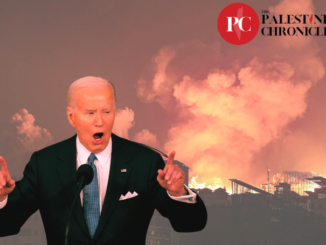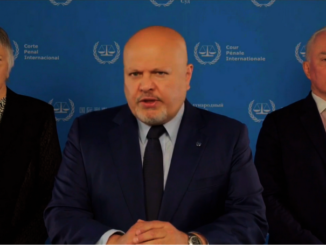
By Benay Blend
On December 11, US President Donald Trump used the occasion of a White House Chanukah reception to announce his signing of an executive order (EO) that requires alleged anti-Semitic incidents be treated in the same way as forms of discrimination based on “race, color, or national origin” as defined in the federal funding rules in Title VI of the 1964 Civil Rights Act.
The draft also refers to the International Holocaust Remembrance Alliance (IHRA) working definition of anti-Semitism, which includes “denying the Jewish people their right to self-determination, e.g., by claiming that the existence of a State of Israel is a racist endeavor,” and “drawing comparisons of contemporary Israeli policy to that of the Nazis.”
By implying that Jews are a separate nationality, it follows that, according to the order, denying “the Jewish people their right to self-determination” is a form of antisemitism.
Moreover, as Noura Erakat observes, the “redefinition reflects Israeli law, where Judaism is legislated as a national status distinct from citizenship. This bifurcation,” she continues, “facilitates and enshrines institutional discrimination because privileges flow through the status of Jewish nationality, which is not territorial.”
Put into the context of recent events, this news could not be worse, or better, in terms of bringing out into the open a free speech struggle by anti-Zionists that has been going on for years. “This is the fight we always wanted,” writes Philip Weiss, a “battle [that] was inevitable” for those on the side of justice for the Palestinian cause.
On the other hand, warns Weiss, Jeremy Corbyn’s recent defeat in Britain might have serious repercussions for pro-Palestinian candidates around the world. To Zionist propagandists, it is a green light to ramp up the hasbara.
Moreover, as recently as December 7, President Trump minced no words when speaking before the Israeli-American Council, a major lobby group.
“Your brutal killers, not nice people at all,” Trump told the crowd. “But you have to vote for me,” he continued, because “you have no choice. You’re not going to vote for Pocahontas, I can tell you that. You’re not going to vote for the wealth tax.”
While “liberal” Zionist groups like JStreet condemned Trump’s use of deeply offensive tropes, they fell short of criticizing his other remark, that some Jews, though “great people—they don’t love Israel enough” to vote for him. “What is remarkable,” writes Ali Abunimah, is how mainstream groups “tip-toed” around the President’s outright maligning of Jewish people. “They are prepared to tolerate an anti-Semite and white supremacist in the White House,” Abunimah claims, as long as he is pro-Israel and anti-BDS (Boycott, Divestment, and Sanctions Movement for Palestinian rights).
The move by Trump via social media drew varied responses across social and other forms of media in what the New York Times described as “competing and discordant ways.” Within the American Jewish community, it comes as no surprise that opinions are divided.
The Anti-Defamation League (ADL) welcomed the news, while at the same time posted an OpEd by its National Director Jonathan Greenblatt which explains how everyone has a “role in fighting white supremacy and online hate.” In so doing, Greenblatt glosses over the ADL’s long history of mobilizing public opinion against black leadership, including more recently taking to task Rep. Ilhan Omar, whose criticism of unqualified American support for Israel encouraged the ADL to launch a drive to pass a federal Anti-Semitism Awareness Act, a precursor, perhaps, of the President’s Executive Order.
Even more insidious, Zioness, whose slogan is the title of this article, attempts to reconcile Zionism and progressivism in its statement, an oxymoron that forms the core of “liberal” Zionists’ efforts to have it both ways.
On the one hand, the group sites rising anti-Semitism, coupled with focus on “the Jews,” to support the President’s statement while at the same time it expresses qualms about a leader who himself “consistently propagates classical antisemitic tropes, and cozies up to white nationalists––including within the senior ranks of his own administration.” On the other hand, such equivocality falls away when they claim that:
“Young Jews who feel called to social action are told by peers, professors and university administrators that they must make a false choice between their progressive identities and their commitment to Jewish liberation (Zionism). They are discriminated against in campus environments that are pervasively hostile, where they cannot learn because they cannot even *be* without fear.”
In their desire to attack BDS, “progressive” Jews are willing to overlook obvious problems surrounding an anti-Semitic, white nationalist President who occasionally throws a bone to segments of the Jewish community, but only if they are willing to support him and his partner in crime, the Israeli government.
Moreover, conflating “progressive identities” with “Jewish liberation” erases the Palestinian movement for liberation, a move that is common to all Zionist groups, “liberal” or otherwise. Not to do so calls into question the legitimacy of the Israeli state. In the end, claims Yoav Litvin, Trump’s EO “equates anti-Zionism with anti-Semitism, targeting Palestinians and their anti-Zionist allies who accurately view Zionism as a racist, white supremacist and settler-colonialist enterprise. It also codifies the notion that Jewish self-determination is necessarily linked to Israel and justifies apartheid and genocide of the indigenous Palestinian people.”
On another level, writes Masha Green in The New Yorker, Donald Trump is, in reality, a “pro-Zionist anti-Semite” as evidenced by his speech before the Israeli American Council. Green refers to her participation in a tour led by Breaking the Silence to explain why she opposes the worst aspects of the Occupation. The new executive order, she concludes, appears not to target anti-Semitism, but to “quash the defense—and even the discussion—of Palestinian rights.” In doing so, she fears it will hamper the First Amendment, the right of free speech.
Yet Green stops short of “oppos[ing] the existence of the state of Israel itself,” a stance that she labels anti-Semitic.
How to move beyond this quagmire created by “liberal” Zionists? What needs to happen, Litvin says, is to “attacks the roots of white supremacy” by calling out Zionism for what he claims it is: “a reactionary white supremacist modern Western settler-colonialist movement.” Going one step further, Palestinians and their allies, in the words of Nada Elia, must
“Let 2020 be the year that we all recommit to a vision of justice for all – in the US, where white supremacy is expressing itself in nativism, Islamophobia and antisemitism, but also in Palestine, where Zionism, which has always maintained that Jews are a “nation” and not just a religion, must also be challenged, as we work to establish justice from the river to the sea.”
– Benay Blend earned her doctorate in American Studies from the University of New Mexico. Her scholarly works include Douglas Vakoch and Sam Mickey, Eds. (2017), “’Neither Homeland Nor Exile are Words’: ‘Situated Knowledge’ in the Works of Palestinian and Native American Writers”. She contributed this article to The Palestine Chronicle.

– Benay Blend earned her doctorate in American Studies from the University of New Mexico. Her scholarly works include Douglas Vakoch and Sam Mickey, Eds. (2017), “’Neither Homeland Nor Exile are Words’: ‘Situated Knowledge’ in the Works of Palestinian and Native American Writers”. She contributed this article to The Palestine Chronicle.







